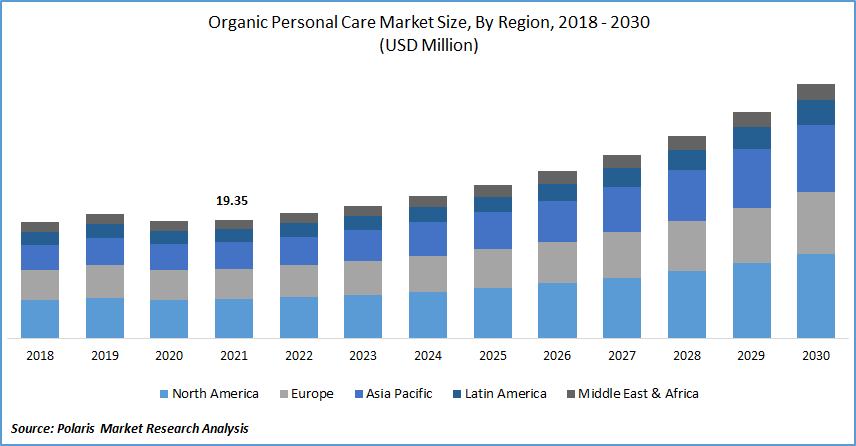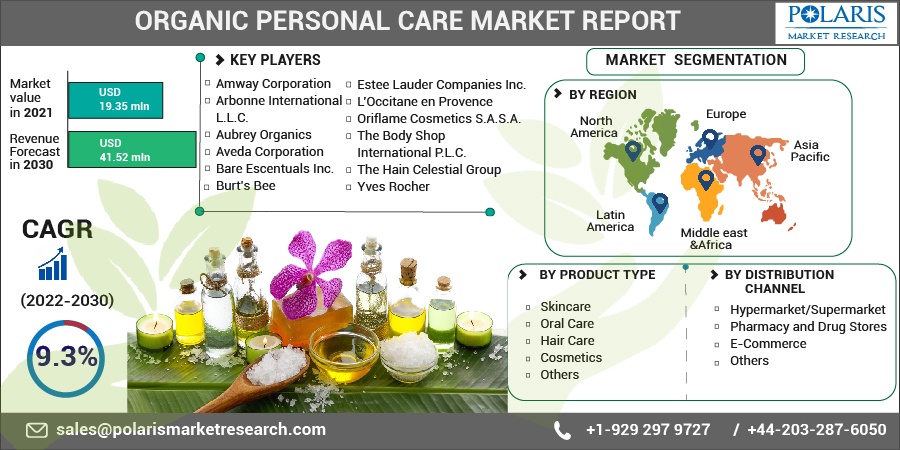
Organic Personal Care Market Share, Size, Trends, Industry Analysis Report, By Product Type (Skin Care, Oral Care, Hair Care, Cosmetics, Others); By Distribution Channel (Offline Stores, Online Platforms); By Region; Segment Forecast, 2022 - 2030
- Published Date:Jun-2022
- Pages: 117
- Format: PDF
- Report ID: PM1055
- Base Year: 2021
- Historical Data: 2018 - 2020
Report Outlook
The global organic personal care market was valued at USD 19.35 Million in 2021 and is anticipated to grow at a CAGR of 9.3% during the forecast period. The demand for organic personal care has increased exponentially due to raising environmental awareness. Increasing attention in the context of chemical-free products has been attributed to the industry's growth.

Know more about this report: Request for sample pages
Organic personal care products are made of natural ingredients without any chemical elements. Also, growing concern regarding the unfavorable impact of chemicals on the skin, such as dryness, skin irritation, and dullness, fuel the industry growth. Home-bound consumers' increasing usage of online purchasing platforms seemingly upscales the demand for these personal beauty products.
The massive youth population in the developing regions is anticipated to drive the organic personal care market. The inclination to look neat at all times and more anxiety regarding the physical aesthetics among the young population is expected to boost the demand for organic personal care products. Additionally, the need for personal hair care is expected to grow significantly in the industry owing to the growing penetration of natural ingredients that provide ammonia and sulfur-free benefits. The ever-increasing need for hair falls control, shining effects, and dandruff protection will impact the industry's growth.
The recent outbreak of the covid-19 pandemic has negatively influenced the global organic personal care market. The key issues that negatively affected the industry growth were the restrictions because of lockdown, termination of manufacturing establishments, and supply chain disturbances.
But the change in health awareness amongst consumers and the speedy penetration of the e-commerce channel accounted for the increasing global demand for personal beauty products. The entire beauty industry is anticipated to have negative growth, but the industry has observed a slight rise. As most people were forced to stay at home during the pandemic, there was a little demand for cosmetics by the women population.
Industry Dynamics
Growth Drivers
Growing investment in the R&D of personal beauty products and the evolving trend of herbal ingredients-based products have inspired manufacturers to initiate new developments. For instance, in April 2021, Refresh Botanical enlarged its reach to India by starting its product line for aging, sensitive, and acne-prone skin types.
The personal beauty products would further be obtainable for buying at brick-and-mortar operations, retail shopping malls situated in prominent cities, and with the emergence of e-commerce platforms such as Flipkart and Amazon. Therefore, these factors have driven the organic personal care market. The growing preference towards personal beauty products among the population is likely to propel the industry's growth. The continuous use of chemical-based cosmetics and personal care products, which has encouraged customers to use natural alternatives, is another crucial factor contributing to global change.
Additionally, millennials who dish out most of the time on the internet have an inflated tendency towards trending online articles, product launches, and celebrity endorsements, thereby pushing the industry. According to the Global Web Index report produced in June 2020, consumers' daily online engagement escalated during the pandemic on all social media platforms.

Know more about this report: Request for sample pages
Report Segmentation
The market is primarily segmented based on product type, distribution channel, and region.
|
By Product Type |
By Distribution Channel |
By Region |
|
|
|
Know more about this report: Request for sample pages
Insight by Product Type
Based on the product type, the skincare segment held the largest market share and is anticipated to rule during the forecast period. The growing skin concerns such as aging and dry skin are pushing product demand. An increase in the product launches by regional and international brands in this segment will likely benefit the holistic industry growth.
For instance, in May 2021, Sukin, an Australian organic beauty brand, launched an age-defying product line. These personal beauty products involve ingredients such as para cress, pure ribose, Crambe oil, hibiscus, and baobab, which assist in lessening wrinkles and maintaining flawless skin. Therefore, growing awareness regarding these ingredients for combating skin concerns is anticipated to drive product demand during the forecast period.
Insight by Distribution Channel
Based on the distribution channel, hypermarkets/supermarkets held the largest revenue share in the forecast period. With consumers' growing tendency towards organic beauty products, several brands are expanding their handouts to hypermarkets/supermarkets.
Advantages provided by the online channels such as shopping from anywhere globally, delivery at the door steps, free shipping, and discounts are alluring consumers to select this channel, thus, driving the demand for the industry. Further, the growing ease and increasing reliance of millennials and gen-z on the internet is expected to drive product sales through distribution channels.
Geographic Overview
Europe is emerging as a region dominating with the largest market share. With the increasing demand for organic ingredients, consumers globally are inclined toward organic beauty products, which is anticipated to push the industry growth during the forecast period. Observing such trends, vital regional players are initiating contemporary products to acquire a maximum share. For instance, in October 2021, Estee Lauder-supported luxury Ayurveda brand Forest Essentials stretched its footprints to the premiere international market in the U.K.
Asia Pacific is expected to record the fastest CAGR in the forecast period. The consumer's increasing consciousness about hygiene and health has improved the demand for chemical-free personalized products. Such factors forced manufacturers to enhance their product offerings to change consumer requirements forcefully.
Many of the brands providing organic products in this region are Mamaearth, Origins, and L'Occitane. Also, the area has a possible growth opportunity because of the growing per capita consumption and the ever-increasing population. Countries like China, Japan, and India are the upcoming economies projected to drive the industry of the Asia Pacific region. The conviction in natural and organic remedies is already embedded in Japanese culture. Thus, it has become simpler for manufacturers to make their organic products bearable amongst the consumers in Japan. These factors have driven the organic personal care market.
Competitive Insight
Some of the major players operating in the global market include Amway Corporation, Arbonne International L.L.C., Aubrey Organics, Aveda Corporation, Bare Escentuals Inc., Burt's Bee, Estee Lauder Companies Inc., L'Occitaneen Provence, Oriflame Cosmetics S.A.S.A., The Body Shop International P.L.C., The Hain Celestial Group, Yves Rocher amongst others.
Organic Personal Care Market Report Scope
|
Report Attributes |
Details |
|
The market size value in 2021 |
USD 19.35 Million |
|
The revenue forecast in 2030 |
USD 41.52 Million |
|
CAGR |
9.3% from 2022 - 2030 |
|
Base year |
2021 |
|
Historical data |
2018 - 2020 |
|
Forecast period |
2022 - 2030 |
|
Quantitative units |
Revenue in USD Million and CAGR from 2022 to 2030 |
|
Segments covered |
By Product Type, By Distribution Channel, and By Region |
|
Regional scope |
North America, Europe, Asia Pacific, Latin America, Middle East & Africa |
|
Key companies |
Amway Corporation, Arbonne International L.L.C., Aubrey Organics, Aveda Corporation, Bare Escentuals Inc., Burt’s Bee, Estee Lauder Companies Inc., L'Occitane en Provence, Oriflame Cosmetics S.A.S.A., The Body Shop International P.L.C., The Hain Celestial Group, Yves Rocher |
